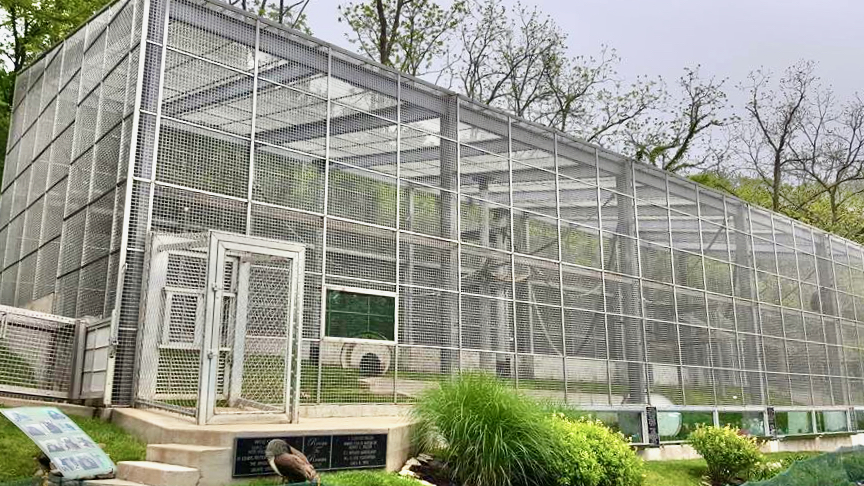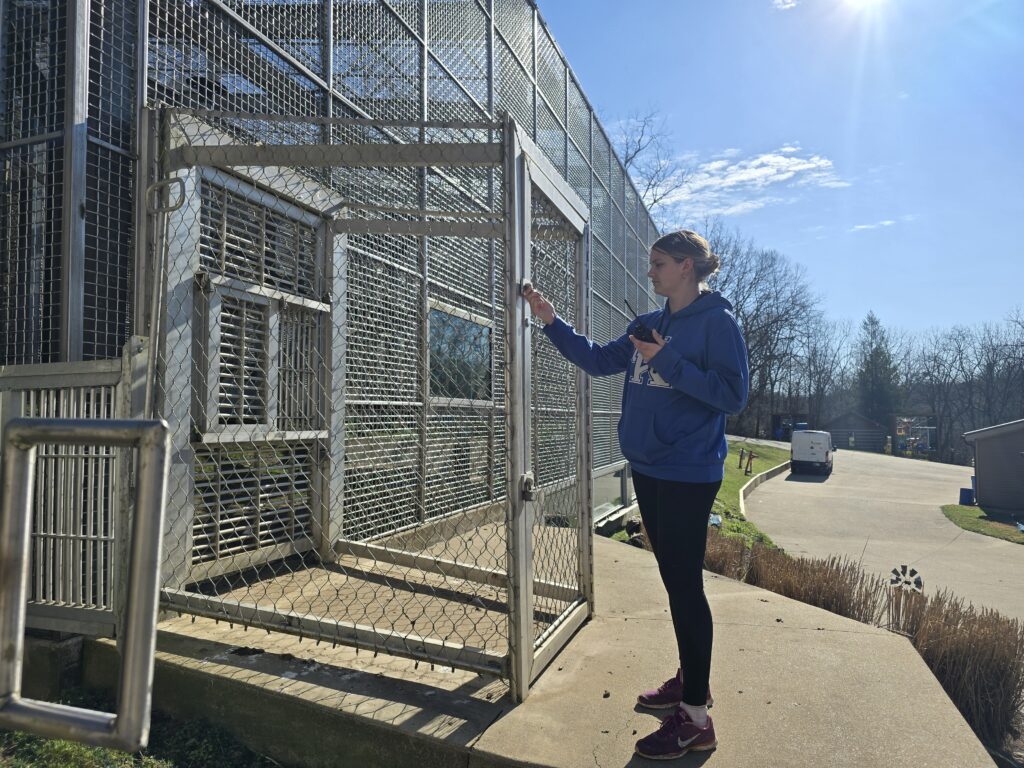Our Sanctuary
The Primate Rescue Center is a 501(c)(3) nonprofit organization

The Primate Rescue Center is nestled on 30 acres in central Kentucky, with buildings and grounds designed to afford the animals a quiet, sheltered place to spend the rest of their lives. The centerpiece of the sanctuary is a state-of-the-art chimpanzee enclosure—currently home to 8 chimpanzees—that was completed in the summer of 2006 and since updated with climbing structures and other improvements designed for the chimpanzees’ enrichment and comfort. An enclosed tunnel allows the chimps to choose where they want to spend their time and move between the spacious outdoor enclosure and their temperature-controlled sleeping and playroom areas.
In addition, the PRC features 10 custom indoor/outdoor monkey enclosures with heated houses; the nearly 40 primates occupying these enclosures can also choose where they wish to spend their time, and, except in the most inclement weather, most venture outdoors for at least part of the day. Providing a well balanced and nutritious diet for so many apes and monkeys is a monumental task: on an average day, our staff, volunteers, and interns process 300 pounds of fresh vegetables, fruit, lettuce, nuts and grains and prepare the primates’ meals in our industrial kitchen.
- Providing sanctuary or referral to appropriate facilities
- Working to end the trade in primates both in the United States and abroad
- Educating the public to the plight of primates caught in the breeder/dealer cycle
- Assisting researchers and zoo personnel in finding appropriate placement for surplus primates
- Encouraging compliance with applicable local, state, and federal laws and animal welfare statutes

The Primate Rescue Center is a tax-exempt, nonprofit organization that receives no direct funding from the federal government or the state of Kentucky. We rely on donations of money, supplies, and in-kind serves from individuals, service providers, foundations, and our corporate partners. You can help too! See our Wish List for a up-to-date list of the food items, equipment and supplies of particular items we need most. We accept donations both by check and online. (Complete information about how to donate is available here.) Those interested in supporting our lifesaving work may also donate vehicles, stocks, bonds, and securities or make in-kind donations, all of which are tax-deductible to the fullest extent of the law. Contact us for details.
The PRC is proud to have been designated a Better Business Bureau Accredited Charity, which assures our commitment to accountability and ethical charitable practices. In addition, we are one of fewer than 2,000 nonprofit organizations (of more than 1 million operating today) granted the Seal of Excellence by the Independent Charities of America—a distinction only awarded to those able to demonstrate the highest standards of public accountability, program effectiveness, and transparency. Since 2013 we have been voted a Great Nonprofits Top-Rated Nonprofit and continue to hold that honor each year. Finally, the U.S. Government has approved us to participate in the Combined Federal Campaign, deemed to be the world’s most exclusive fund drive.
To help you further assess our success in fulfilling our mission, each year we post online our Annual Report (764 KB PDF) from the prior calendar year. as well as our most recent IRS Form 990, which provides details on how revenues are raised and spent. These documents can be found on our Financials Page and include financial data from our annual IRS tax filings and our final audited financial statements.

How long has the Primate Rescue Center been in operation?
How large is the facility?
Is the PRC open to the public?
The PRC is not a public attraction, and does not offer public visiting hours. Unlike zoos, theme parks, “pseudo-sanctuaries,” and other public attractions, we strive to ensure that the animals under our care live in as stress-free an environment as possible. Although visitors may be well meaning and well behaved, some of our residents are wary of strangers and very protective of their territories. We do, however, host an invitation-only PRC Member Event each spring for members and supporters, giving them the opportunity to witness firsthand the gift of sanctuary they are providing to the apes and monkeys through their donations.
How many animals does the Primate Rescue Center care for?
Our capacity – and our current population – is just under 50 monkeys and apes. The PRC is currently home to 8 chimpanzees, and about 40 monkeys: crested black macaques, capuchins, long-tailed macaques, pigtail macaques, rhesus macaques, a Japanese macaque, spider monkeys, vervet monkeys, and an elderly siamang gibbon.
We also have peafowl roaming the sanctuary grounds. They function as part of our clean-up crew, and our early-warning system should there be any unusual activity on the property.
Where do these animals come from?
Some of the monkeys living at the PRC spent years as subjects in biomedical research; others were confiscated from those not licensed to keep them. But most of the Center’s monkeys are former pets whose owners were unable to provide them with the specialized care required for these exotic wild animals and turned to us for help. This is an often-repeated scenario in the primate trade: individuals pay dealers hefty fees for cute, cuddly, and dependent babies, only to find they’ve made a terrible mistake when their growing “pets” become stronger, wilder, and potentially dangerous. In some cases, monkeys arrive here after having seriously injured their owners or others. We provide lifetime care to these individuals who have no other options, and as part of our mission we also educate the press and public about why owning a monkey may be perilous for everyone involved, especially the monkey or ape.
The PRC is currently home to 8 chimpanzees, who arrived in two groups: seven youngsters came here in 1996 from a biomedical research laboratory in New York (Pozna and Cory, members of this group passed away in 2016 and 2020), and five adults were rescued two years later from a private pet situation in Georgia in which they had spent decades in squalid conditions (Debbie, another member of the “Dahlonega 5” passed away in 1998 shortly after rescue, and Hazel passed away in 2016). In the summer of 2000, the two groups were united into one cohesive unit that more resembles the social dynamic of a natural chimpanzee troop. Both the adults from Georgia and the adolescents from the New York laboratory have benefited tremendously from this integration, as it has enabled more complex interactions and social opportunities
Are the Center’s chimpanzees and monkeys encouraged to breed and produce offspring?
How much money is required to care for each animal?
Does the PRC get financial assistance from the federal government or the state of Kentucky to help cover these costs?
How can I donate to the PRC?
As a nonprofit organization that receives no governmental funding, we rely on the generosity of foundations, businesses, and individuals. Grants from foundations have helped us expand our chimpanzee quarters and increase our storage capacity and general efficiency, while local grocers have over the years provided us with ongoing donations of produce and other foods. Because such donations still leave a hefty shortfall in our annual operating budget, we rely on donations by individuals to cover our Animal Care Program costs, including veterinary bills, employee salaries and benefits, utilities, maintenance, and all the other costs directly associated with providing our residents top-notch care.
We accept donations both by check and online via Paypal or GIVEDIRECT, a nonprofit service that processes credit-card payments for us. Those interested in supporting our lifesaving work may also donate vehicles and securities or make in-kind donations. Contact us for details.
If you would like to help our residents, check out all the ways you can Donate Now.
How can I be certain that my donations are being well spent?
Do you have a special veterinarian who provides medical care?
Does the PRC use volunteers?
Where can I learn more about the issues involving the private ownership of primates?
For those who want to delve deeply into all issues related to the private ownership of primates, we highly recommend Animal Underworld: Inside America’s Black Market for Rare and Exotic Species. Authored by Alan Green and the Center for Public Integrity, this eye-opening, award-winning book is the definitive look at the trade in primates and other non-native species. We’re proud to be featured in the book as an exemplary sanctuary. You can read our review of it here.
Chimp-proof and Caregiver-Safe: Sanctuary Security in Action
Security at the Primate Rescue Center isn’t just about locks and doors—it’s about ensuring a safe, stable and enriching environment for both the primates and the humans who care for them.
Chimp Enrichment – Barrel Feeders
The chimps enjoyed two new barrel feeders, created by one of our summer interns, Riley Welch!
PRC Member Event 2025
The 2025 PRC Member Event was an incredible day of celebration for the rescued chimps and monkeys who call this sanctuary home!
